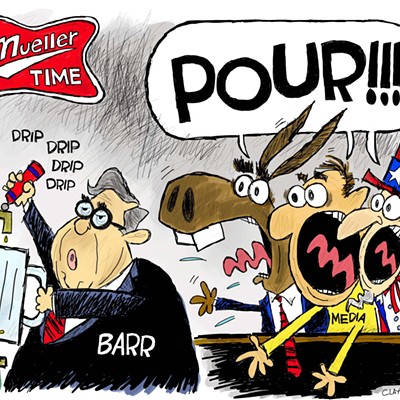What's needed is a fair and balanced primer on the precise meanings of what were once respectable, descriptive words but have, thanks to talk-radio hosts and lazy journalists, lost their original meanings and come to denote something completely different (or nothing at all).
A few centuries ago, a liberal was a person who believed in the wonders of a laissez-faire economic system. In more recent times, the word became associated with the sound bite "tax and spend." On some occasions, the most vehement anti-liberal will even toss out "socialist" in the same sentence as liberal, thus raising the specter of godless poets running the country. As a result of this sustained attack on an otherwise innocent word, liberal has developed a slightly unsavory flavor (besides being stripped of any meaning whatsoever)--hence Hillary's expressed desire to be labeled "progressive."
Like another word we are condemned to see too many times between now and November 2008--populist--progressive has its roots in the 19th century. I leave it to you, curious reader, to research these movements and learn how they affected the nation's political landscape. These days, progressive can mean anything anyone wants it to mean since the word's cachet rests with the first eight letters: progress. A politician who uses "progressive" wants to convey a belief in, well, "progress" as contrasted to opponents, who are clearly Neanderthals since they weren't hip enough to jump on the usage first.
Don't be fooled. Like "liberal," "progressive" no longer has any definable meaning and is only useful to pols who want to pre-empt their critics, or the media, from labeling them with the much-maligned "L" word.
I doubt we'll see any presidential candidate using "populist" as a descriptive device. What we will see is the establishment press using the word as code for any political position promising to benefit working- and middle-class Americans at the expense of the wealthy and entrenched power brokers. Like the word "liberal," "populist" also carries an odor suggesting the unruly masses. But where liberal has (unfairly) an East Coast, Kennedyesque, noblesse oblige quality many people in the Midwest find incomprehensible, populist connotes (unfairly) a pig-roast barbecue with beer, chips and onion dip.
Centrist is one of those terrific words that can lull the gullible into the mistaken belief a candidate is taking an unthreatening, middle-of-the-road approach to issues. Beware. Since the meanings of "left" and "right" are subject to our quicksand politics, centrist as a descriptor has as much credibility as some bimbo celebrity's sworn sobriety after 348 flirtations with rehab.
Which brings us to "conservative." Once an honorable word describing stalwart public servants in the Barry Goldwater tradition, the word has been corrupted by politicians who favor restricting the right to vote to evangelical Christians. These pols pepper their speech with Elmer Gantry-like exhortations referencing God and country, often while spending their nights snorting coke, frolicking in the theater of kinky sex or indulging some pedophile fantasy.
Finally, two words, "radical" and "extreme" can only be understood relative to whoever is using them. Forget what the dictionary says about these words; when they are employed in a political context, they are as meaningful as an article on string theory written by Paris Hilton. For example, the idea of universal health care administered by the federal government may be considered simultaneously radical and sensible depending on whom you ask. Or a pre-emptive strike on Iran may be hailed as completely rational by William Kristol, but as an act of extreme insanity by, say, Dennis Kucinich.
Since we can't depend on words to accurately describe almost anything about politics, what can we depend on? Not much, I'm afraid. Eyes have ways of revealing more about a person than words. Had voters taken a close look at George W.'s peepers, we might have noticed a gaze more suitable to a swaggering frat boy than a president.
Candidates mouthing whatever rhetoric they think will get them elected is far from unusual, but wouldn't it be wonderful if there were some superhero lurking in the murk of politicians' posturing who, like Toto in The Wizard of Oz, dashed in at just the right moment to tear away the curtain of fabrications and reveal the truth?






